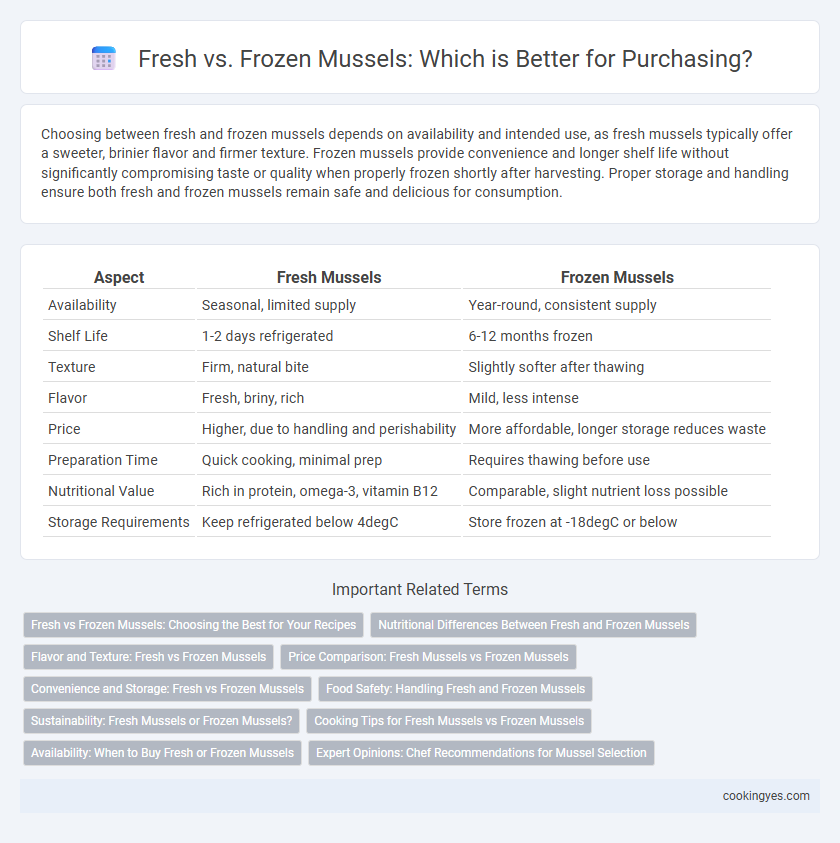Choosing between fresh and frozen mussels depends on availability and intended use, as fresh mussels typically offer a sweeter, brinier flavor and firmer texture. Frozen mussels provide convenience and longer shelf life without significantly compromising taste or quality when properly frozen shortly after harvesting. Proper storage and handling ensure both fresh and frozen mussels remain safe and delicious for consumption.
Table of Comparison
| Aspect | Fresh Mussels | Frozen Mussels |
|---|---|---|
| Availability | Seasonal, limited supply | Year-round, consistent supply |
| Shelf Life | 1-2 days refrigerated | 6-12 months frozen |
| Texture | Firm, natural bite | Slightly softer after thawing |
| Flavor | Fresh, briny, rich | Mild, less intense |
| Price | Higher, due to handling and perishability | More affordable, longer storage reduces waste |
| Preparation Time | Quick cooking, minimal prep | Requires thawing before use |
| Nutritional Value | Rich in protein, omega-3, vitamin B12 | Comparable, slight nutrient loss possible |
| Storage Requirements | Keep refrigerated below 4degC | Store frozen at -18degC or below |
Fresh vs Frozen Mussels: Choosing the Best for Your Recipes
Fresh mussels offer superior texture and flavor, maintaining their natural brininess and tender meat, ideal for recipes requiring distinct seafood freshness. Frozen mussels provide convenience and extended shelf life, ensuring availability year-round without sacrificing too much quality, especially in cooked dishes like stews or pasta. Selecting between fresh and frozen mussels depends on recipe requirements, cooking time, and desired taste profile, with fresh preferred for raw or lightly cooked applications and frozen favored for long storage or quick meal preparation.
Nutritional Differences Between Fresh and Frozen Mussels
Fresh mussels retain higher levels of certain heat-sensitive nutrients such as vitamin C and omega-3 fatty acids compared to frozen mussels, which may experience slight nutrient degradation during freezing and thawing processes. Frozen mussels, however, maintain comparable protein content and essential minerals like zinc, iron, and selenium, offering a nutritionally valuable option when fresh mussels are unavailable. Proper freezing techniques and quick freezing can help preserve the nutritional integrity of mussels, minimizing the differences between fresh and frozen varieties.
Flavor and Texture: Fresh vs Frozen Mussels
Fresh mussels typically offer a more vibrant, briny flavor and a tender, slightly chewy texture that seafood enthusiasts prefer. Frozen mussels, while convenient and longer-lasting, can experience slight changes in taste and may become softer or less firm after thawing due to ice crystal formation. Choosing fresh mussels ensures optimal flavor intensity and a satisfying mouthfeel, especially for dishes where mussels are the star ingredient.
Price Comparison: Fresh Mussels vs Frozen Mussels
Fresh mussels typically cost more per pound than frozen mussels due to higher handling and storage requirements. Frozen mussels offer a cost-effective alternative with longer shelf life, making them a popular choice for budget-conscious consumers. Pricing can vary by region and season, but frozen products generally provide better value without compromising nutritional content.
Convenience and Storage: Fresh vs Frozen Mussels
Frozen mussels offer superior convenience with longer shelf life and easy portion control, making them ideal for storage without immediate consumption. Fresh mussels require prompt use within a few days and careful refrigeration at temperatures between 1-4degC to maintain quality and safety. Choosing frozen mussels reduces waste and eliminates the need for rapid consumption, while fresh mussels provide a more traditional seafood experience when access to quick use is assured.
Food Safety: Handling Fresh and Frozen Mussels
Handling fresh and frozen mussels requires strict adherence to food safety guidelines to prevent contamination and spoilage. Fresh mussels should be kept at temperatures below 5degC and consumed within 24 hours of purchase to minimize bacterial growth. Frozen mussels, stored at -18degC or lower, maintain their safety and quality for several months, with proper thawing in the refrigerator critical to avoid pathogen proliferation.
Sustainability: Fresh Mussels or Frozen Mussels?
Fresh mussels often have a lower carbon footprint than frozen mussels because freezing requires additional energy for processing and storage. However, frozen mussels reduce food waste by extending shelf life, supporting sustainability through less spoilage during transportation and retail. Choosing local fresh mussels or sustainably harvested frozen options ensures minimal environmental impact while maintaining quality.
Cooking Tips for Fresh Mussels vs Frozen Mussels
Fresh mussels require thorough rinsing and debearding before cooking, and they generally cook faster, typically steaming in 5-7 minutes until shells open. Frozen mussels are often pre-cooked and can be reheated by steaming or sauteing for 3-4 minutes, offering convenience but a slightly softer texture. Properly storing fresh mussels in a cool, ventilated space preserves flavor and texture, while frozen mussels should be thawed gradually in the refrigerator to maintain quality during cooking.
Availability: When to Buy Fresh or Frozen Mussels
Fresh mussels are most readily available during their peak season, typically from late fall to early spring, when water temperatures are cooler and mussels are at their best quality. Frozen mussels offer year-round availability, providing a convenient option when fresh mussels are out of season or hard to find. Choosing frozen mussels ensures consistent supply and minimizes spoilage risk, especially in regions distant from coastal sources.
Expert Opinions: Chef Recommendations for Mussel Selection
Chefs emphasize that fresh mussels offer superior flavor and texture, making them the preferred choice for gourmet dishes. Expert recommendations highlight the importance of purchasing shellfish sourced locally and consumed within 24 hours to ensure peak freshness. When fresh mussels are unavailable, frozen options provide convenience while retaining essential nutrients if properly handled and thawed.
Fresh vs Frozen for mussel purchase Infographic

 cookingyes.com
cookingyes.com